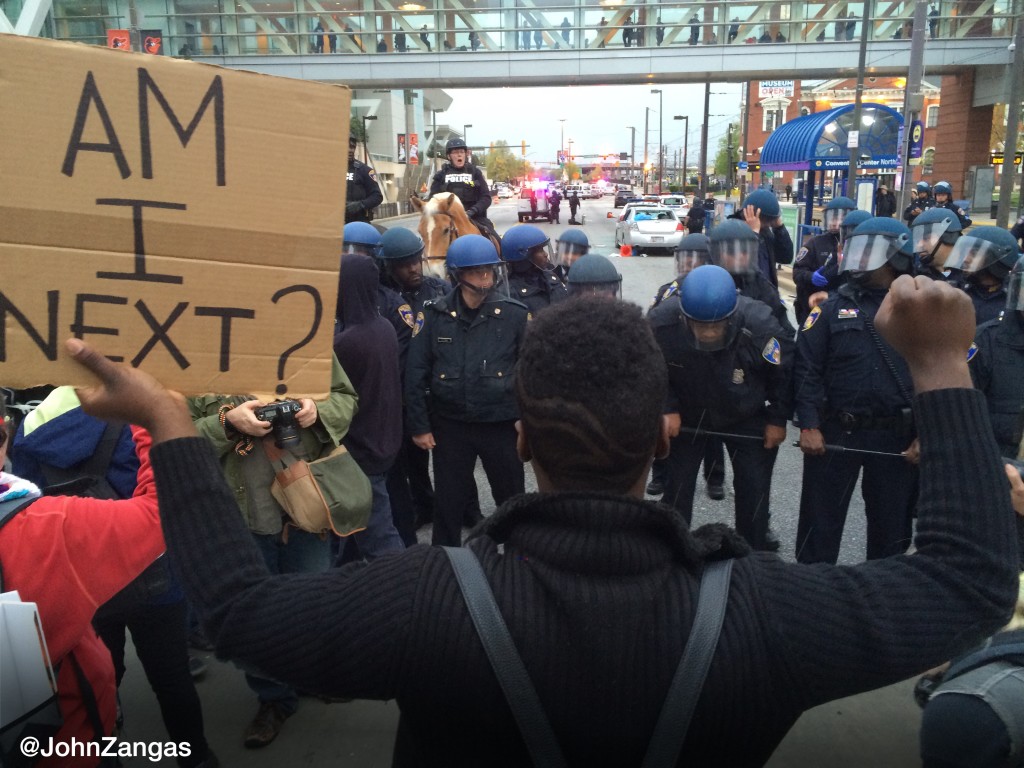Sometimes the hardest thing for a person with privilege is learning how to listen.
I count myself as part of that challenge: I’m a white woman with a college degree who high-tailed it out of the St. Louis suburbs to settle down with my husband in the Washington, DC suburbs.
When I watched my city burn last summer after the death of Michael Brown, I recalled firsthand examples of the de facto segregation that turned St. Louis into a powder keg. But I had always been fortunate enough to watch from afar, from a sanitized distance. After much hand-wringing, both in person with friends and on Twitter, I eventually learned that the best way for me to contribute from afar was to lend my ear, and the occasional re-tweet, to the brave voices on the ground crying Black Lives Matter.
So when news started to break about protests in Baltimore over the police killing of Freddie Gray taking a destructive turn, I readied myself to be the best listener I could. This is the story that I heard from so many news sources:
#BREAKING – Rioters continue to loot a CVS drug store at North and Pennsylvania avenues in Baltimore. pic.twitter.com/rRf0yjiI2z
— Action News on 6abc (@6abc) April 27, 2015
BREAKING: CVS that had been looted in #Baltimore now on fire; billows of smoke showing. http://t.co/7dq8IX9jjA pic.twitter.com/m2enkcf5DK
— NBCWashington (@nbcwashington) April 27, 2015
CVS got employees out of store just before looting, fire http://t.co/umVhTjgi0O pic.twitter.com/GJDvjZ7ZOm
— wbaltv.com (@wbaltv11) April 28, 2015
To be clear: I absolutely do not condone criminal activity or violence. But it is grossly inappropriate—even dangerous—for the media to focus on the things that got stolen from a neighborhood CVS in such a sensationalized manner. It implies that the inanimate objects on a shelf in a store have more value than the human being whose spine was allegedly severed in the backseat of a cop car.
I’ve worked in TV and I get it: burning buildings make great live shots to capture the viewer’s attention. But it is then the media’s responsibility to hold that attention and put these images into context. Otherwise, a looted CVS on the corner of North and Pennsylvania exists in a vacuum; and that vacuum will be filled by misconceptions and missed opportunities for real solutions.
Stolen property does not mean more than stolen lives and opportunities for those living in Baltimore’s poorest, most vulnerable communities. Destroyed goods are not more important than the social, economic and political factors that have led to destroyed neighborhoods long before Gray’s death.
A man died, and people are responding. A system is broken, and people are responding.
Socially conscious consumerism means looking at the things you buy from a broader perspective, and asking yourself how your things impact the people around you. This means socially conscious consumers must watch the developments in Baltimore with a critical eye, realizing the role consumer goods play in this ongoing struggle.
The power of your purchases, no matter how well-intentioned, will never matter more than the power of people reacting to injustice and working towards social change.
 Photo credit: John Zangas, Vision Planet Media, via Flickr | CC-BY-NC-ND 2.0
Photo credit: John Zangas, Vision Planet Media, via Flickr | CC-BY-NC-ND 2.0Stephanie Levy is a writer, editor, and web producer living in the D.C. area. A graduate of the University of Missouri School of Journalism, she has covered everything from education policy to dumpster-diving for beer (seriously).
